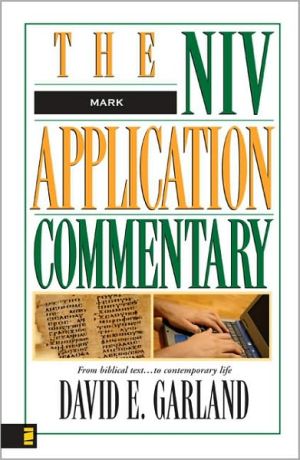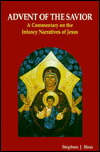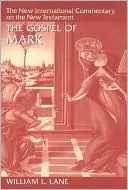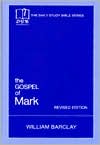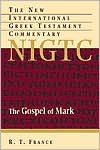Mark
Most Bible commentaries take us on a one-way trip from the twentieth century to the first century. But they leave us there, assuming that we can somehow make the return journey on our own. In other words, they focus on the original meaning of the passage but don't discuss its contemporary application. The information they offer is valuable -- but the job is only half done! The NIV Application Commentary Series helps us with both halves of the interpretive task. This new and unique series...
Search in google:
'Mark,' which is part of the NIV Application Commentary Series, helps readers learn how the message of Mark's Gospel can have the same powerful impact today that it did when Mark first wrote it.
Mark\ \ By David E. Garland \ Zondervan\ Copyright © 1996 Zondervan\ All right reserved.\ ISBN: 0-310-49350-1 \ \ \ \ Introduction\ In the glare of the Jerusalem sun, Jews from every nation jostle each other to get a closer look and to hear twelve men speak about God's most recent display of power. One man named Peter raises his voice to address a crowd some fifty days after his Master was crucified in this very city. He solemnly declares that the Holy Spirit has come upon them, inaugurating the new age. \ "Men of Israel, listen to this: Jesus of Nazareth was a man accredited by God to you by miracles, wonders and signs, which God did among you through him, as you yourselves know. This man was handed over to you by God's set purpose and foreknowledge; and you, with the help of wicked men, put him to death by nailing him to the cross. But God raised him from the dead, freeing him from the agony of death, because it was impossible for death to keep its hold on him." (Acts 2:22-24)\ In this speech we have the basic outline of Mark's Gospel, which tells more fully the story of what happened. What was hidden during Jesus' public ministry can now be made public to clarify the basis of the Christian faith in Jesus.\ The Title of the Gospel\ The opening of Mark's Gospel (1:1) is as abrupt as its ending (16:8). Does this first verse function as a subtitle introducing the subject matter of the first few verses? Is it the beginning of a clause that ends in verse 3? Or is it the title of the whole work? If the first option is correct, then it simply announces that what follows in the next verses launches the story of Jesus' ministry, death, and resurrection. In this case, the story this Gospel tells has its beginning with the preaching of John the Baptizer and Jesus' baptism and temptation in the wilderness. No other subtitles appear in the Gospel, however, which makes this interpretation less likely. The second option takes this opening line as the beginning of a sentence that concludes with the scriptural citation in verses 2-3: "The beginning of the gospel of Jesus Christ, Son of God, as written by Isaiah the prophet ..."; this interpretation affirms that the beginning of the gospel story accords with Isaiah's promise of long ago, thus matching the apostles' preaching in Acts, which traced the beginning of the story to the baptism of John (Acts 1:22; 10:37; 13:24-25).\ The third option for interpreting this opening line reads it as the title of the whole Gospel (1:2-16:8): "The beginning of the proclamation of the good news about Jesus Christ, the Son of God" (full stop). Modern readers are accustomed to books with attractive dust jackets trumpeting the title of the work and the name of the author, appealing graphics designed to grab the attention of potential buyers, and a snappy blurb summarizing its contents and recommending its purchase. The opening pages of modern books include a title page, a foreword, a preface, and an introduction to provide the reader with some background information before they begin to read. Ancient writers did not have such luxuries, but they did try to alert the reader to the scope of the work with a title or introductory phrase. The opening line, "the beginning of the good news about Jesus Christ, the Son of God," tells us what this work is about. It immediately informs the reader that the story this book recounts is no typical one.\ If this interpretation is correct, then the whole Gospel of Mark is about a beginning. One advantage of this reading is that it sheds light on the perplexing ending, where Mark abruptly quits his story: The women flee from the tomb, trembling with fright, and say nothing to anyone (16:8). Mark does not finish the story because the announcement of Jesus' resurrection and his going before his disciples to Galilee is not the final stage. The reader cannot put the book down at the closing line and chalk it up as a good read. The story of the gospel about Jesus Christ continues. On the one hand, the reader knows that the fearful silence of these women could not have been the end of the matter. Something else must have happened, or else we would not be hearing or reading this Gospel. On the other hand, the reader must ask questions: How will the fear of the women be vanquished? How will their mouths be opened? How will the word of good news get out? The answers to such questions can only be found by returning to the beginning "where the reader is reminded that it is all a beginning." Mark must now be reread and reheard "with 20/20 hindsight." The conclusion to this story is only the beginning of the proclamation of good news about Jesus Christ that goes on to the end of time and to the ends of the earth (13:10; 14:9). The Greek word arche ("beginning") can also indicate the basis or foundation of something, as in the sentence, "The fear of the Lord is the beginning of wisdom" (Ps. 111:10). This Gospel is more than just a chronicle of the genesis of God's good news. It is the ground of the church's proclamation of that good news.\ The Gospel\ The title contains three key terms that are vital for understanding what this work is about: the gospel, Christ, and Son of God. The first term, the gospel, did not yet refer to a literary genre (a book telling the story of the life and teaching of Jesus) when Mark wrote. The word appears in 1:14, 15; 8:35; 10:29; 13:10; 14:9 and refers to what is preached about God or about Jesus as the Christ, the Son of God. It refers to the whole story about Jesus that not only is narrated in the text but is also told in oral tradition and must supplement the text-the words, deeds, death, and resurrection of Jesus and what it all means as God's act to save humankind.\ While the term gospel is as familiar as water to most modern readers, it had a variety of associations in the first century. In calling the story of Jesus Christ "the gospel," Mark gives the term a twist that would have surprised first-century readers, particularly in Rome. In the Greek translation of the Old Testament, the verb from which this noun is derived (euangelizo) was used for the proclamation of the news of victory from the battlefield. Cranfield notes, however, that most of the inhabitants of the Roman empire would have associated the word with the emperor cult, which represented the announcements of such events as the birth of an heir to the emperor, his coming of age, and his accession to the throne as glad tidings or gospels. These imperial glad tidings "represent the pretentious claims of self-important men" and the fawning flattery of their vassals. A frequently cited inscription from the Roman province of Asia decrees that the birthday of the emperor Augustus (September 23) would now mark the beginning of the year when persons assumed civil office. It was filled with exaggerated praise:\ ... it is a day which we may justly count as equivalent to the beginning of everything-if not in itself and in its own nature, at any rate in the benefits it brings-inasmuch as it has restored the shape of everything that was failing and turning into misfortune, and has given a new look to the Universe at a time when it would gladly have welcomed destruction if Caesar had not been born to be the common blessing of all men.\ The decree resolves that:\ Whereas the Providence which has ordered the whole of our life, showing concern and zeal has ordained the most perfect consummation for human life by giving to it Augustus, by filling him with virtue for doing the work of a benefactor among men, and by sending in him, as it were, a saviour for us and those who come after us, to make war to cease, to create order everywhere ... and whereas the birthday of the God [Augustus] was the beginning for the world of the glad tidings that have come to men through him ... Paulus Fabius Maximus, the proconsul of the province ... has devised a way of honouring Augustus hitherto unknown to the Greeks, which is that the reckoning of time for the course of human life should begin with his birth.\ What constitutes good news in this edict is the cessation of wars and the bringing of benefits and social order. Succeeding emperors became even more enamored with themselves and claimed to bring new and greater benefits. Those who profited were the usual recipients of favor, the privileged and powerful. The glad tidings about Jesus, by contrast, are significantly different. (1) It has its origins in God (Rom. 1:1; 15:16; 2 Cor. 11:7; 1 Thess. 2:2, 8; 1 Peter 4:17), who is the beginning and end of all things and the true source of blessing for humankind. (2) The good news cannot be separated from what Jesus said and did as the one who came to give his life as a ransom for many (Mark 10:45). The emperors of Rome belong to the dim past, and we do not think of them in any way as a present reality. One is more likely to ask, "Who was Augustus?" than "Who is Augustus?" By contrast, Jesus' work abides in the present because we ask, "Who is Jesus who continues to reign in the hearts of his subjects?" (3) The peace and the benefits that Jesus brings do not come from crushing resistance with military terror but from his death on the cross. Consequently, Christianity does not offer a series of gospels with each succeeding ruler but only one, the gospel. (4) The benefits are universal and bestowed on everyone. They are offered to the outcast, the sinner, and the poor, Jew and Gentile alike, not just to the privileged few. This story is truly good news for the entire world.\ The Christ\ The gospel is about "Jesus Christ." The term Christ means "anointed one" and would have sounded strange to Greek ears. Mark offers no further explanation about the meaning of the word, which suggests that his intended audience was already familiar with it as well as with much of the story. Many characters in the Gospel, however, will use the title but have no idea of what it means for Jesus of Nazareth to be the Christ. As the story unfolds, it becomes plain that one must throw out all preconceptions of what Christ means. Only after Jesus' death and resurrection can one understand the momentous nature of the news that he is God's Christ.\ The title Christ quickly assumed the force of a proper name and has completely lost its original force for the modern reader. Some today may even assume that "Christ" is Jesus' surname, as the son of Joseph and Mary Christ. Others may consider it to be some foreign, generic title of lordship: the holy Christ (like Shah, Rajah, or Kaiser). Christians may simply presume that it refers to the one and only Christ, in whom we believe. For the Greek-speaking Jews of Jesus' day, however, Christ (= Messiah) was a title of the one anointed by God to carry out specific tasks related to the liberation of Israel. The term probably evoked a constellation of hopes for different Jews.\ Views about the role of the Christ, when he would come, how he would be recognized, and what precisely he would do, varied. A few well-situated Jews were quite satisfied with the status quo and probably cared less about such speculation except as it threatened their power base. Among the rest, there was general agreement that the Messiah would be Moses-like in delivering the nation of Israel, that he would establish his throne in Jerusalem like David, that he would smash those who made the people suffer, as did the saviors of old (Neh. 9:27), and that he would rule with justice and restore the lost fortunes of the nation. Like Cyrus, also identified as God's anointed (Isa. 45:1), the Messiah would subdue nations before him and make kings run in his service. No longer would Israel be the footstool of heathen overlords but would take its proper place of ascendancy in the world. The author of the Psalms of Solomon voiced this dream in the first century B.C.\ See, Lord, and raise up for them their king,\ the son of David, to rule over your servant Israel\ in the time known to you, O God.\ Undergird him with the strength to destroy the unrighteous rulers,\ to purge Jerusalem from gentiles\ who trample her to destruction;\ in wisdom and in righteousness to drive out\ the sinners from the inheritance;\ to smash the arrogance of sinners\ like a potter's jar;\ To shatter all their substance with an iron rod;\ to destroy the unlawful nations with the word of his mouth;\ At his warning the nations will flee from his presence;\ and he will condemn sinners by the thoughts of their hearts\ (17:21-25).\ This kind of false hope helped spark the disastrous revolt against Rome in A.D. 66. The first-century Jewish historian, Josephus, contends that the Jewish rebels were provoked to war by their misunderstanding of an "ambiguous oracle in their sacred scriptures, to the effect that at that time one from their country would become king of the world."\ Obviously, proclaiming one who was crucified to be the Christ must have created a severe case of cognitive dissonance for both the early Christians and their Jewish counterparts, whom they were trying to convince. Jesus won no decisive victories worthy of historical mention anywhere but in the Gospels, and these were spiritual triumphs. John the Baptist gets more press in Josephus's account of Jewish history of this era than Jesus does. What little he did write about Jesus has been heavily edited by later Christian copyists. Jesus established no earthly reign. Rome still ruled the world with an iron hand. When Mark wrote, the Roman juggernaut was either about to or had already exacted severe retribution for Israel's rebellion by sacking Jerusalem and burning the temple. Jesus the Messiah had come and gone, and the golden age had not arrived. Consequently, it was easy for many Jews to dismiss him as another dismal failure.\ What was even more absurd, Jesus had been crucified like a criminal. Paul himself cites the theological hitch that a crucified Messiah created: "Cursed is everyone who is hung on a tree" (Gal. 3:13; cf. Deut. 21:23). Justin Martyr, in his record of an exchange with Rabbi Trypho about the Christian faith, cites Daniel 7 in an attempt to prove that Jesus was the Messiah. Trypho remains unpersuaded and responds: "Sir, these and suchlike passages of scripture compel us to await One who is great and glorious, and takes the everlasting Kingdom from the Ancient of Days as Son of Man. But this your so-called Christ is without honour and glory, so that He has even fallen into the uttermost curse that is in the Law of God, for he was crucified." From a Jewish standpoint, a crucified Messiah was an oxymoron, like calling a prisoner on death row, "Mr. President."\ \ Continues...\ \ \ \ Excerpted from Mark by David E. Garland Copyright © 1996 by Zondervan. Excerpted by permission.\ All rights reserved. No part of this excerpt may be reproduced or reprinted without permission in writing from the publisher.\ Excerpts are provided by Dial-A-Book Inc. solely for the personal use of visitors to this web site. \ \
http://zondervan.com/media/samples/pdf/0310493501_samptoc.pdf
